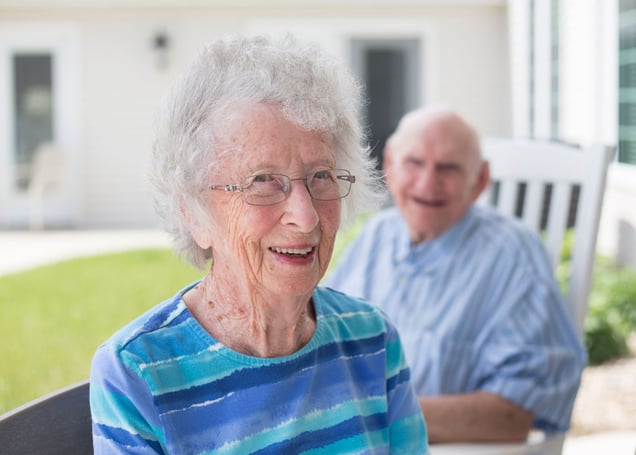
There are many resources available to older adults as they age and face complications related to medical diagnoses, decreased mobility, and cognitive decline. These resources can offer support to the older adult as well as to their family members who are often worried about safety, health, and what comes next.
While it is wonderful to have so many services and resources that provide assistance to keep older adults healthy and comfortable, family members especially can find it difficult to sift through the options as they search for the best one for their situation. Determining which senior care solution is best for your loved one can feel like trying to learn an entirely different language.
However, if you have the right information, you can begin to determine which solution might fit now, and in the future.
Home care is one such option that can be confusing for family members. If you are wondering if home care could be the best option for your aging parent, here are a few questions to consider that might help point you in the right direction.
What Is the Long-Term Prognosis?
Home care services are brought into the older adult’s home, empowering them to stay at home safely for longer. However, home care services can also quickly get expensive, with most of them charging by the hour and asking for hourly minimums per day or week.
While paying for home care services hourly might not seem unrealistic when the needs are just a few hours per week or month, more support may be needed over time, which will quickly increase the expense. As you consider home care as a potential solution to your loved one’s health and safety, be sure to think about the long-term prognosis and how that might affect services one month or a few years down the road.
For example, someone living with cognitive decline might need increased support as their dementia progresses. Similarly, someone with significant mobility issues might end up needing overnight care in order to prevent nighttime falls. Adding more and more hours, including overnight care, can significantly impact your loved one’s budget.
Of course, no one can know for certain the type of care your loved one will need in the future. However, their physician can give sound advice. Be sure to include your loved one’s physician in the conversation as you make a decision on home care services.
Is it time to get help for you or your loved one? Take our 4-minute assessment to get more detail on the right direction for you.
Take the AssessmentHow’s Their Diet?
Eating well means consistently eating healthy foods as well as foods that meet any physician recommendations. However, it is common for seniors to find preparing fresh and healthy meals for just themselves overwhelming and too time-consuming. Instead, many older adults turn to an easier alternative: processed foods. Unfortunately, these convenience foods are not always the best solution and can be packed with sodium and other troublesome ingredients.
Home care caregivers typically can provide assistance with food preparation, including planning healthy meals, shopping for the ingredients, and even making meals to store in the fridge. If your loved one is able to grab a portioned container out of the fridge and warm it up independently, they can eat well for all three meals of the day.
If your loved one is unable to reheat healthy meals from the fridge or cabinet, a home care caregiver coming three times per day—or staying all day every day—to ensure nutritious eating might not be a realistic option for your budget. Look to assisted living options instead, as those communities offer three meals daily that are nutritious, delicious, and comforting.
Is Your Loved One Lonely?
Recent research collected by the Centers for Disease Control and Prevention points to social isolation and feelings of loneliness as a significant health problem among older adults. In fact, isolation has been linked with a number of serious physical and mental health conditions, ranging from depression to heart disease and rapid cognitive decline.
Home care agencies typically offer companionship visit options, which means a caregiver will arrive at your loved one’s home to offer a friendly visit periodically throughout the week. These companionship visits can be paired with light housekeeping duties, and they’re a wonderful way to ensure someone is visually checking in on your loved one’s home and health.
Isolation and loneliness can occur even for seniors who still see family members and friends a few times per week. This means that feeling connected might not happen with a caregiver visit a few times per week either.
It’s important to note, though, that if your loved one is generally isolated at home, the best solution might not be an occasional home care visit for companionship or wellness checks. Instead, the best option might be assisted living, where they can receive assistance in addition to having a community full of new neighbors and friends.
Is the Home Simply Too Big for Your Loved One’s Needs?
Home care services bring support to an adult in their home, giving them the assistance they need to remain in that home for longer. However, you might be wondering if the house is simply too big for your loved one’s needs right now, even with additional home care support.
It’s common for older adults and their loved ones to be reluctant to leave the family home. After all, there are so many good memories tucked inside the walls and around every corner. However, holding onto a home for sentimental reasons often overlooks the fact that the older adult is struggling to get up the stairs to their bedroom, dragging the laundry from one side of the house to the other, or feeling frustrated that they can’t keep up with cleaning or other household tasks. Living in a home that is too big can end up leaving older adults expending too much energy on daily tasks and feeling exhausted.
Often, the best decision is to focus on rightsizing the home. This means finding a solution that is just the right size for what your loved one needs so that they can have the energy they need to do the tasks and activities they want to do.
Have You Explored Assisted Living?
Although a senior living community is not always the right alternative to home care services, there are plenty of benefits that assisted living and memory care communities offer that are not available from visiting home caregivers.
In assisted living, for instance, residents enjoy living in a home that is the perfect size to manage with access to amenities and services they don’t have in the family home. Assisted living residents can enjoy eating three chef-styled meals in the dining room daily with their neighbors without worrying about prep or cleanup. At Cedarhurst communities specifically, our Living TRUESM program ensures residents have the opportunity to take part in a variety of personalized and group events ranging from yoga classes to book club discussions and beer tastings.
Perks of assisted living don’t stop after dining and events. Communities feature 24-hour caregiving team members who are there to lend a helping hand any time of the day or night. This provides residents the support they need and empowers them to use their extra time and energy to create a lifestyle they love.
For those seniors living with Alzheimer’s disease or another type of dementia, memory care communities can offer the around-the-clock support and safety in a homelike environment. Perhaps even more importantly, residents in a memory care community have the opportunity to form connections with other residents.
Beyond Home Care: The Next Steps
Home care is certainly a viable solution for seniors who need a little bit of extra support at home. However, if your loved one is lonely, will need more help in the future, or is living in a home that is simply too big for them to care for, the best long-term solution might be a senior living community.
Learn more about how to determine if it is time for a senior living community by taking our assessment.




.png?width=307&height=200&name=Blog%20%2333%201400%20x%20700%20(1).png)

.png?width=307&height=200&name=Blog%20%2332%201400%20x%20700%20(8).png)



